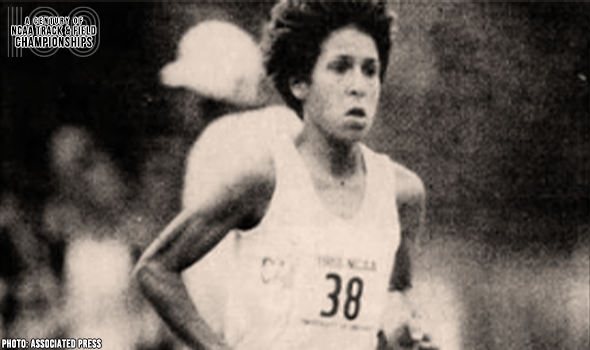
Mosqueda’s 10K Record Caps Incredible Year
November 21, 1987
Sylvia Mosqueda of Cal State Los Angeles won the individual title at the 1987 NCAA Division II Cross Country Championships in Evansville, Indiana, by 24 seconds in 16:57. That remained the largest margin of victory in meet history until seven years later.
May 1, 1988
Sylvia Mosqueda set a blistering pace at the U.S. Women’s Olympic Marathon Trial in Pittsburgh, Pennsylvania. She opened up a 1½-minute advantage through five miles and continued to lead through 17 miles before dropping out not long after. It was noted by Christine Brennan in the Washington Post that “(Eventual winner) Margaret Groos and the others completely lost sight of Mosqueda along some stretches of the hilly, tree-lined course.” (Mosqueda was pulled out of the race by her coach after noticing her toes had ripped through her shoes, which rubbed her feet so raw that her socks filled with blood.)
June 1, 1988
Sylvia Mosqueda, still just days after recovering from a two-week battle against chicken pox and the flu, dominated the 10,000-meter final at the NCAA Division I Outdoor Track & Field Championships at Hayward Field in Eugene, Oregon. She took the lead with 21 laps to go and pushed the tempo on her way to a 16-second win, as well as the collegiate record and meet record of 32:28.57.
“The night before the race, my coach (Gudrun Armanski) took me out to the track and told me, ‘You can be champion, if you want,’” Mosqueda recalled to the USTFCCCA earlier this month. “I don’t know if I truly believed him, but I trusted my training. Our game plan was to run the first mile in 5:10 and then do whatever I wanted to from that point on.”
“I wish somebody would have recorded it on video. Now that I’m 54-years old, that race has always stood out in my mind. I can close my eyes and envision the entire 10,000 — just as it was. I would love to know if it looked that way to everybody else, too.”
Mosqueda, who enters her second year as head coach of the cross country and track & field programs at Pepperdine University in 2020, saw her records last for quite a few years.
The collegiate record of 32:28.57 held strong until 1994 when Carole Zajac of Villanova went 32:22.97 at the Penn Relays, while her all-time best at the NCAA final site remained atop the chart for 24 more years after that.
Back in 2018, Sharon Lokedi of Kansas led a squadron of sub-32:30 women at Hayward Field. Lokedi won the NCAA title in a 32:09.20 MR and five other women dipped under Mosqueda’s mark as well: Dorcas Wasike of Louisville – 32:11.81; Karissa Schweizer of Missouri – 32:14.94; Alice Wright of New Mexico – 32:17.92; Charlotte Taylor of San Francisco – 32:17.95; Anna Rohrer of Notre Dame – 32:26.24.
The NCAA and collegiate track & field will mark a momentous milestone in the spring of 2021 -- the 100th anniversary of the NCAA Championships and with that, the NCAA Track & Field Championships. In June 1921, the University of Chicago hosted the first track & field championships in NCAA history.
This point can’t be emphasized enough: Not only was the event the first for NCAA track & field, but the first championships for any sport under the sponsorship of the NCAA.
To celebrate, over each of the next 365 days, the U.S. Track & Field and Cross Country Coaches Association (USTFCCCA) will celebrate moments, student-athletes, and coaches that have made a century’s worth of championships special. From humble beginnings to important historical milestones to the modern-day, collegiate track & field has evolved with the American society.
The 2021 edition of the NCAA Division I Outdoor Track & Field Championships begin with preliminary round action on May 27-29 in Jacksonville, Fla., and College Station, Texas. The championships final site and culmination of the celebration is slated for June 9-12, 2021 at the newly rebuilt Hayward Field in Eugene, Ore.
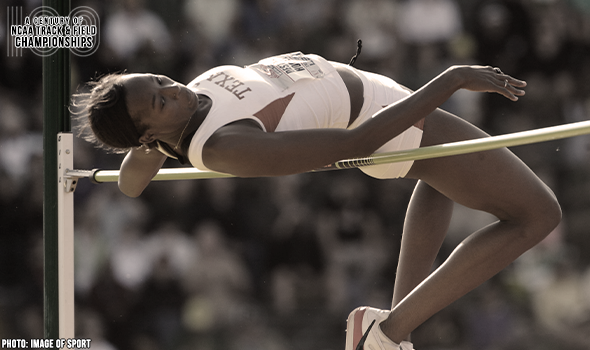
Texas’ Hooker High Jumped To NCAA Glory
Destinee Hooker won three career high jump titles at the NCAA DI Outdoor T&F Championships, including a massive victory in 2009 by more than two inches.
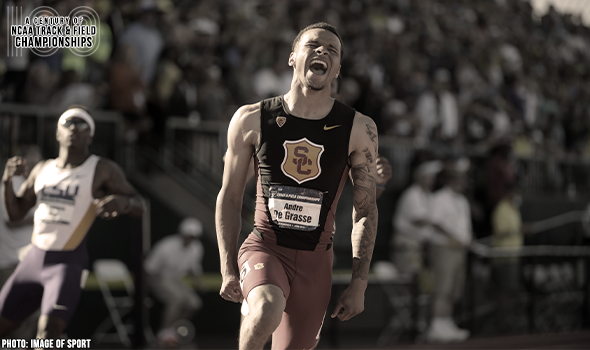
De Grasse Sprinted To Otherworldly Double
Andre De Grasse completed the 100-200 double at the 2015 NCAA DI Outdoor T&F Championships with scorching times: 9.75 (+2.7) in the 100; 19.58 (+2.4) in the 200.
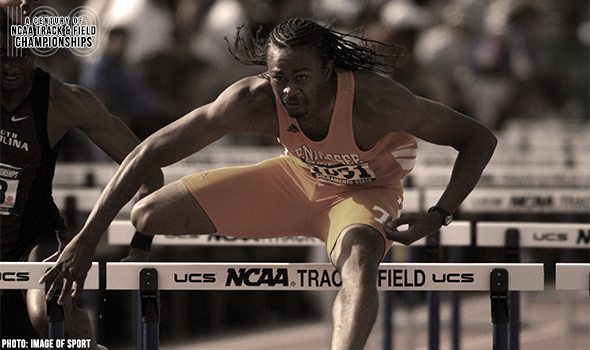
Merritt Broke Long-Standing 110H MR In 2006
Aries Merritt broke a 28-year-old meet record in the 110H when he won the crown at the 2006 NCAA DI Outdoor T&F Championships in 13.21.
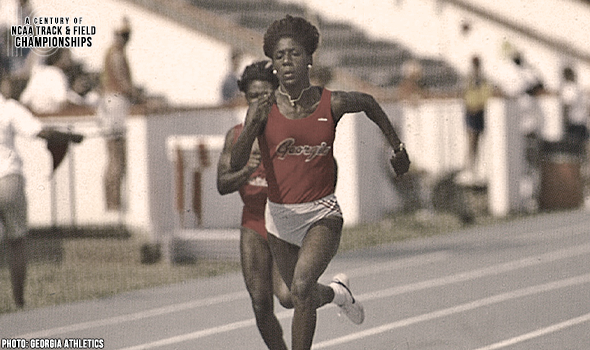
UGA’s Torrence Made NCAA History With Double
Gwen Torrence completed the 100-200 double at the 1987 NCAA DI Outdoor T&F Championships. Torrence was also the first woman to finish top-8 four times in the 100.
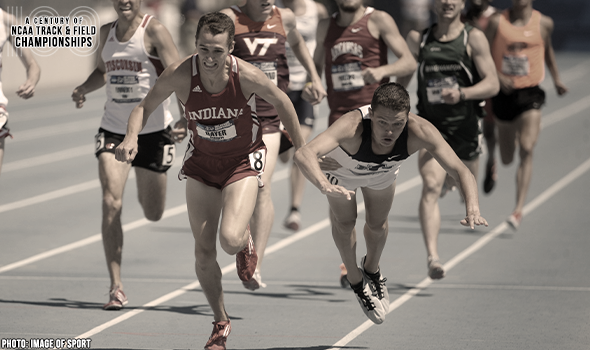
Bayer Gave It His All For NCAA 1500 Title
Andrew Bayer won the 1500 at the 2012 NCAA DI Outdoor Track & Field Championships in one of the closest finishes in meet history – 0.01 seconds.

Tipton Led 1-2-3 Oregon Finish In 1964 JT
Les Tipton led the first podium sweep of any event in the history of the NCAA Outdoor T&F Championships. Tipton and his Oregon teammates went 1-2-3 in the 1964 javelin.

K-State’s Jones Captured Heptathlon Crown In 2015
Akela Jones won the heptathlon at the 2015 NCAA DI Outdoor T&F Championships with 6371 points. That is the fourth-best score in both collegiate history & meet history.

Same Athletes, Same Result For LSU At NCAAs
The LSU foursome of Bennie Brazell, Pete Coley, Robert Parham, Kelly Willie swept the 4×100 & 4×400 crowns at the 2003 NCAA DI Outdoor T&F Championships.

Martin Won Distance Titles For Two Programs
Francis (Frank) Martin made history twice in the NCAA Outdoor Track & Field Championships.

FSU’s Williams Soared To Jumps Double In 2009
Kim Williams swept the horizontal jumps at the 2009 NCAA DI Outdoor T&F Championships. Williams was particularly dominant in the TJ, winning at 14.38m (47-2¼) & by nearly 2 feet.

